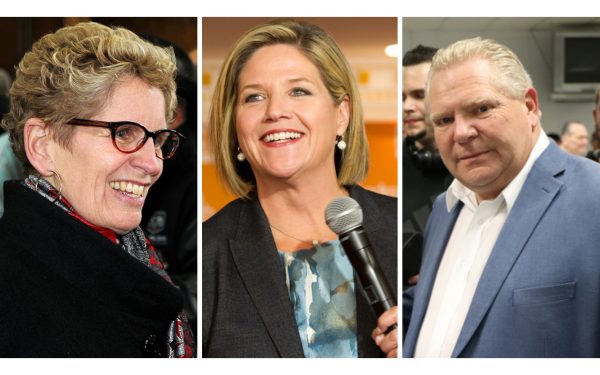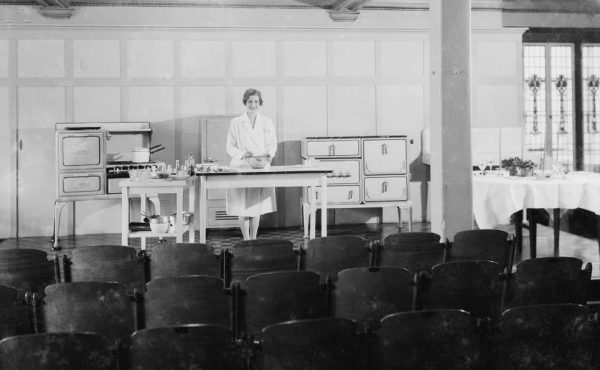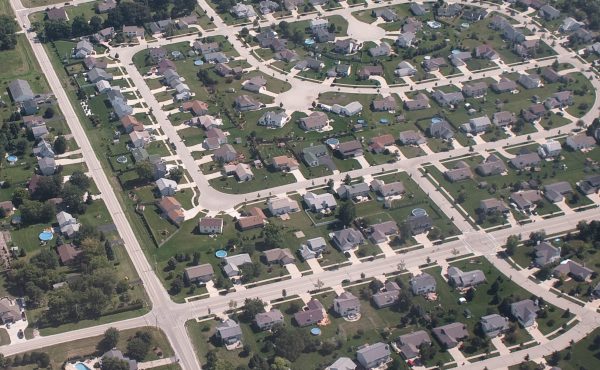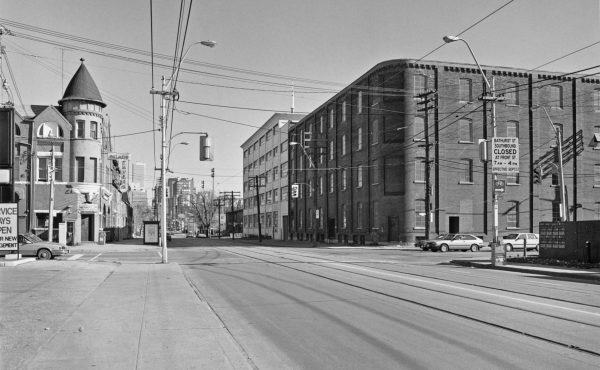In so many ways, Doug Ford’s bluster bus is already the most riveting story of this spring’s election, although his response to yesterday’s Liberal budget was more about waffles than red meat.
The acclaimed candidate for Etobicoke North produced lots of predictable mouth-breathing about the Wynne government’s proposed deficits, but nothing in the way of specific counter-proposals. But to my eye, his forbearance seems like an entirely defensible communications strategy: better for the Tories to let their opponents self-immolate than risk having their best campaign planks get caught up in the media vortex of a budget day.
For all the easy comparisons to Donald Trump, many of which Ford has actively encouraged, the dynamic right now looks a great deal more like 1995, and the Mike Harris sweep.
The question is whether this swing back is inevitable, or if there are other options for voters?
The political comparisons to the mid-1990s are hard to ignore: Bob Rae was limping into an election at the end of a decade of various permutations of Liberal/NDP rule. First came a short-lived minority coalition, then an only slightly longer lived Liberal majority, and finally Rae’s unexpected NDP majority win in 1990, a moment when the province’s economy was more than a little tottery.
I’d argue (not originally) that for much of her term in office, Wynne has run a more or less self-consciously NDP-style government. I know the Hydro One privatization is as confounding to this analogy as Rae’s contentious 1993 “social contract” pitch to public sector unions to take so-called Rae Days to help dial back the deficit.
But otherwise, the second half of Wynne’s term has had the distinct cast of a social democratic state, as evidenced by recent moves (e.g., free prescriptions for children and teens, the $15 minimum wage, etc.). Same can be said for much of yesterday’s budget, which is, of course, nothing more than an election platform, not to mention a referendum on Ontarians’ appetite for massive deficit spending.
It’s entirely possible that Ford is simply going to hoover up the change sentiment, just as Harris did in 1995, with what will be — now, as then — a slogan-rich/policy-light appeal to suburban middle class and rural voters who’ve lost the plot on all the social progressivism of the incumbent government.
Ontario, however, isn’t the same place it was when Mike Harris came to power. Between 1996 and 2016, the Greater Golden Horseshoe’s population jumped from 6.9 million to 9.2 million. Along the way, the proportion of Ontarians living in this extended megalopolis crept up, from 64% to 69% — an indication of how the province is not only becoming more urban, but more concentrated in this region.
It has also become home to a dense concentration of tech companies that mostly didn’t exist in the pre-Blackberry days of the mid-1990s. Today, some 15,000 firms in the Toronto-Waterloo corridor employ 200,000 tech workers doing jobs that also didn’t exist at that pre-World Wide Web moment.
Similarly, the proportion of immigrants in the province has risen from 26% to over 29%, with the vast majority of newcomers settling in this region. The early 1990s, too, was a period of rising immigration, but attitudes towards newcomers have completely flipped, according to Environics social values tracking. When Harris became premier, over 60% of the population agreed that immigration levels were too high. Today, almost 60% disagree with that stance.
Yet will increasing urbanization and more progressive social values preclude a hard-right backlash? In an election in which voters are thirsting for new faces, my question is this: While Ontarians clearly dislike Wynne & Co., does it follow that voters also dislike their progressive approach to government?
I don’t think one necessarily follows from the other, especially because of the demographic shifts mentioned above. I’m not suggesting that newcomers tend to be politically progressive, but there’s ample evidence from all over the world that large urban areas with large immigrant, low income and/or racialized minority populations are more likely to be liberal in their outlook on the role of the state. Hard-right regimes tend not to find strong support in dense and diverse urban regions.
As some commentators are noting, Andrea Horwath and the NDP could be the obvious beneficiaries to the anti-Wynne sentiment. If the two parties are occupying the same fiscal space, notes the National Post’s Chris Selley, “why not vote NDP instead?” It’s a good question and one that I suspect is prompting Horwath to outflank Wynne with promises of ever more generous social programs (e.g., the $1.2 billion dental plan pledge announced in recent days).
But I’d say that Horwath’s obvious electoral opportunity right now is not to try to out-spend and out-program the Liberals, but rather do just the opposite: present herself as a leader who can be trusted to run the province without completely abandoning Tommy Douglas’ fiscal principles. Indeed, at a time when unemployment is low but the province’s export-driven manufacturing base is threatened by the protectionist bully in the White House, she could plausibly advance the argument that what the province now needs isn’t Wynne’s ubiquitous helping hand nor Ford’s attacks on the deep state, but rather a combination of stable management and a new set of eyes.
Justin Trudeau’s Liberals seized the change imperative in 2015 by tacking to the left of Thomas Mulcair’s NDP. Seems to me Horwath should be looking to do the opposite, aiming for the middle space that Wynne and the Liberals have vacated — the space where most urban Ontario voters live.






2 comments
It is pretty evident that Canadians, even Ontarians, find the benefits of “political ideology” evasive and useless in 2018. (See Michael’s Enright’s recent panel discussion on the topic.) So why does the media persist to breathe life into something so lifeless and unhelpful? As you point out New Democrats will govern with a Tory ideology when power presents itself. And the Tories never really manage to ‘shrink the government’ when they get their turn. Not only is Doug Ford ‘getting a pass’ from real scrutiny in your logic. Your Kathleen Wynne is a cartoon figure at best. All leaders seem to get away with gossipy speculation. When our media is unable to investigate the matter a leader’s practical intentions, our electorate gets ‘slogan rich/policy light’ bullshit in return. Everyone I have met is struggling to make a choice this time. You could do better than warm over some empty speculations. Perhaps you could report on something you have taken the effort to investigate?
Did the liberal government actually have a plan or a strategy at all? Most of the initiatives seem poorly thought out, the flailings of a drowning person. Anything to stay in power.
The gov, hasn’t really delivered or has been slow to deliver transit solutions (note the Star’s April 19, 2018 story that Finch LRT will be delayed another year, to 2023, a decade after the originally proposed completion date). With “friends” like this, does transit need enemies?
The debt is actually worse than the liberals claim, the Globe and Mail explores the dubious accounting practices to hide the electricity cost.
https://www.theglobeandmail.com/canada/investigations/article-bad-books-how-ontarios-new-hydro-accounting-could-cost-taxpayers/